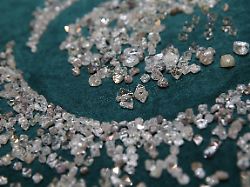Diamonds and new oil tarnish
EU approves twelfth sanctions package against Russia
December 14, 2023, 10:32 p.m
Almost 22 months after the start of the Russian attack on Ukraine, the EU is clearing the way for a twelfth sanctions package. Among other things, an import ban on diamonds is planned. The price cap for Russian oil exports, which has recently had little effect, is to be tightened.
The EU states have agreed on new sanctions against Russia. A spokeswoman for EU Council President Charles Michel confirmed in the evening that the 27 summit participants in Brussels had agreed on the green light for a further package of punitive measures. This should be formalized in a written procedure on Friday.
The package therefore includes a ban on imports of diamonds. In addition, the price cap for Russian oil exports to third countries, which has recently had little effect, is to be tightened. An import ban is also planned for other goods with which Russia fills its war chest. These include autogas, which is also known as camping gas in Germany (liquefied petroleum gas, LPG). Punitive measures are also planned against people and organizations that support the Russian war of aggression against Ukraine. According to the EU Commission, these include other members of the Russian armed forces as well as those responsible for the IT sector.
Belgium gives up resistance
In contrast to Great Britain, the EU has not yet imposed a ban on the import of diamonds from Russia. For a long time, the reason was primarily the resistance of Belgium, where the Flemish port city of Antwerp has been one of the most important diamond centers in the world since the 16th century. Russia is considered the world’s largest producer of rough diamonds. In 2021, the state diamond miner Alrosa had revenues of 332 billion rubles (around 3.41 billion euros).
In addition to the economic punitive measures, according to the EU, sanctions are planned against more than 100 other people and organizations that support Russia’s war of aggression against Ukraine. They would then no longer be able to dispose of assets existing in the EU. The affected people will also no longer be allowed to enter the EU. For example, they are said to come from the Russian military, defense and IT sectors.
The last package of sanctions to date came into force in June. For example, it included an instrument against the circumvention of sanctions that have already been imposed. There has long been a far-reaching import ban on crude oil, coal, steel, gold and luxury goods, as well as punitive measures against banks and financial institutions.
